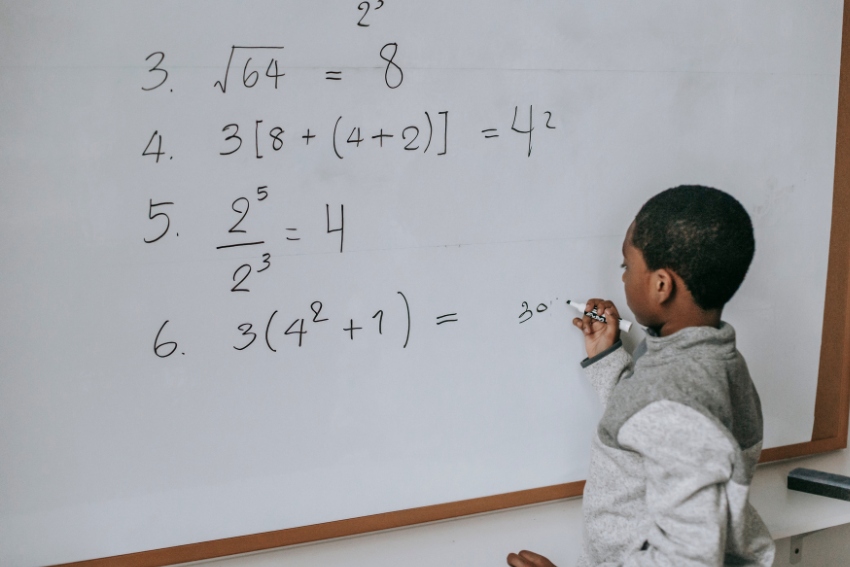Further Maths GCSE is often seen as one of the toughest subjects a student can take. It goes beyond the standard GCSE Maths curriculum and is designed for those who excel in mathematics. This blog will explore why Further Maths is so challenging and help you decide if it’s the right option for your child.
While some students thrive on this level of difficulty, others may prefer to focus on less demanding GCSE subjects that better suit their strengths and future goals.

What is Further Maths GCSE?
Further Maths GCSE is an advanced qualification for students who are strong in mathematics. It covers a wide range of complex topics such as algebra, calculus, and matrices. Unlike standard GCSE Maths, this course prepares students for A-level Maths and even university-level maths. It’s not mandatory, but it’s highly recommended for those who have a passion for the subject.
What Makes Further Maths GCSE Challenging?
- Complex Topics:
Further Maths covers advanced mathematical concepts that go beyond the regular GCSE Maths syllabus. Topics like matrices, differentiation, and advanced algebra require a deeper understanding. - Depth of Knowledge:
In this course, you’ll need to master more difficult topics. It’s not just about solving problems; you must understand the theory behind each concept. This level of understanding is what makes Further Maths challenging for many students. - Fast Pace:
The course moves quickly. With a lot of content to cover, the pace can feel overwhelming. You’ll need to stay on top of your work and ensure you’re grasping each concept before moving on to the next. - Exam Difficulty:
The exams are tougher than standard GCSE Maths. The questions are more complex, and there’s less margin for error. Success requires not only good problem-solving skills but also a deep comprehension of the subject.
What is the Pass Rate of GCSE Further Maths?
The pass rate for GCSE Further Maths varies each year, but it’s generally higher than many other subjects. This is because students who take Further Maths are often among the most capable and motivated in their year group. Most schools offer it as an optional subject to those who excel in standard GCSE Maths, meaning the cohort is usually made up of high-achievers.
In 2023, for instance, the overall pass rate for GCSEs was around 67%, but the pass rate for Further Maths tends to be significantly higher. The exact percentage can vary depending on factors such as the exam board, difficulty of the paper, and performance across schools.
However, it’s important to note that the term “pass rate” in Further Maths can be relative. Since the subject is often taken by top-tier students, a pass may be considered achieving a grade 5 or above. Many students aim for the highest grades (7-9), and because of the advanced nature of the subject, they may feel that anything below this is underperforming.
Impact on Grade Boundaries
The high ability of students taking Further Maths also impacts Grade Boundaries. Since most students score well, the boundaries for the top grades (8 or 9) can be quite high. This means students need to be well-prepared not just to pass, but to secure top marks.

Who Should Consider Taking Further Maths GCSE?
Further Maths is ideal for students aiming for careers in science, technology, engineering, or maths (STEM). If you’re planning to take A Level Maths or continue to Further Maths A Level or want to study maths-heavy subjects at university, this course will give you a strong foundation. Students who excel at GCSE often continue to A Level, where practising with A Level further maths past papers becomes essential for success. Many of the problem-solving and reasoning skills developed as early as the 11 Plus stage continue to be essential throughout advanced maths studies, making early preparation especially valuable.
However, it’s not for everyone. If you already find standard GCSE Maths difficult, it may not be the right fit. You should assess your current abilities and speak to a teacher for advice.
How to Succeed in Further Maths GCSE
- Regular Practice:
Practice is essential in Further Maths. You need to work on problems consistently, not just before exams. The more you practise, the more confident you’ll become with complex problems. - Understanding the Concepts:
Focus on understanding the “why” behind each topic. Memorisation alone won’t help in Further Maths. You need to grasp the underlying concepts to tackle the harder questions. - Seek Extra Support:
Don’t hesitate to seek extra help. Online resources, tutoring, and revision guides can make a big difference. Tutors can provide personalised help, making challenging topics easier to understand. - Time Management:
Balancing Further Maths with other GCSEs can be difficult. Make sure you plan your study time effectively, prioritising areas where you need the most practice.
Real Student Experiences
Many students find Further Maths GCSE difficult but rewarding. Some students describe it as challenging but manageable with the right effort. Others say it was their favourite subject because they enjoyed pushing their abilities to the next level.
Here’s a quote from one student:
“Further Maths was tough, but it made A-level Maths so much easier. If you’re willing to put in the work, it’s worth it.”
Is It Worth It?
Taking Further Maths GCSE has several benefits. It sets you up for A-level Maths, makes university applications stand out, and provides a deeper understanding of mathematical principles. Even if it’s challenging, the skills and knowledge you gain will be incredibly valuable in the future.
Conclusion
Further Maths GCSE is undoubtedly a challenging course, but for the right student, it’s incredibly rewarding. If you love maths and enjoy a challenge, this course will push your abilities and set you up for success in future studies. Think carefully, assess your current skills, and seek advice before deciding.
Further Maths is a challenging but rewarding subject that can set students apart academically. If your child is aiming for top grades or preparing for future studies, personalised guidance can make all the difference. At Edumentors, we provide access to experienced tutors from the UK’s leading universities . Edumentors’ maths tutors offer tailored lessons, clear explanations, and effective revision strategies designed to boost confidence and mastery of even the most complex topics.








